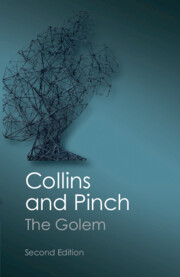Book contents
- Frontmatter
- Dedication
- Contents
- Preface to second edition
- Preface to first Canto edition
- Preface and acknowledgements
- Introduction: the golem
- 1 Edible knowledge: the chemical transfer of memory
- 2 Two experiments that ‘proved’ the theory of relativity
- 3 The sun in a test tube: the story of cold fusion 5
- 4 The germs of dissent: Louis Pasteur and the origins of life
- 5 A new window on the universe: the non-detection of gravitational radiation
- 6 The sex life of the whiptail lizard
- 7 Set the controls for the heart of the sun: the strange story of the missing solar neutrinos
- Conclusion: putting the golem to work
- Afterword: Golem and the scientists
- References and further reading
- Index
Introduction: the golem
Published online by Cambridge University Press: 05 February 2014
- Frontmatter
- Dedication
- Contents
- Preface to second edition
- Preface to first Canto edition
- Preface and acknowledgements
- Introduction: the golem
- 1 Edible knowledge: the chemical transfer of memory
- 2 Two experiments that ‘proved’ the theory of relativity
- 3 The sun in a test tube: the story of cold fusion 5
- 4 The germs of dissent: Louis Pasteur and the origins of life
- 5 A new window on the universe: the non-detection of gravitational radiation
- 6 The sex life of the whiptail lizard
- 7 Set the controls for the heart of the sun: the strange story of the missing solar neutrinos
- Conclusion: putting the golem to work
- Afterword: Golem and the scientists
- References and further reading
- Index
Summary
Science seems to be either all good or all bad. For some, science is a crusading knight beset by simple-minded mystics while more sinister figures wait to found a new fascism on the victory of ignorance. For others it is science which is the enemy; our gentle planet, our feel for the just, the poetic and the beautiful, are assailed by a technological bureaucracy – the antithesis of culture – controlled by capitalists with no concern but profit. For some, science gives us agricultural self-sufficiency, cures for the crippled, and a global network of communication; for others it gives us weapons of war, a school teacher's fiery death as the space shuttle falls from grace, and the silent, deceiving, bone-poisoning, Chernobyl.
Both these ideas of science are wrong and dangerous. The personality of science is neither that of a chivalrous knight nor that of a pitiless juggernaut. What, then, is science? Science is a golem.
A golem is a creature of Jewish mythology. It is a humanoid made by man from clay and water, with incantations and spells. It is powerful. It grows a little more powerful every day. It will follow orders, do your work, and protect you from the ever threatening enemy. But it is clumsy and dangerous. Without control, a golem may destroy its masters with its flailing vigour.
- Type
- Chapter
- Information
- The GolemWhat You Should Know About Science, pp. 1 - 4Publisher: Cambridge University PressPrint publication year: 2012



